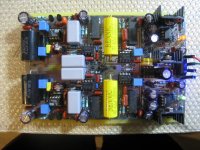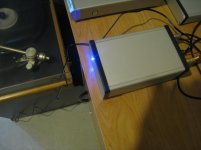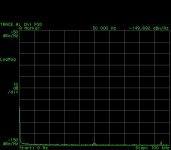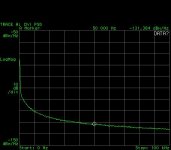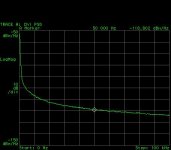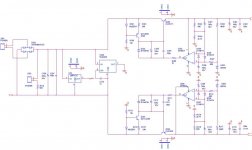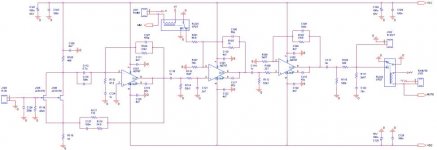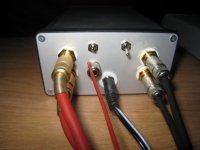As you probably know, I recently decided it's time to enjoy my old vinyl collection. I got a VPI HW-19 MK3 (which I eventually upgraded to the Scout platter and bearing), with AudioQuest PT-9 tonearm and Benz Micro Silver cartridge. I got originally a NAD PP3 phono preamp, paying $150 for essentialy a couple of 5532 opamps in a small metal case. After a little listening, I was having difficulties plotting the fastest course to BayBloor Radio to return the thing...
So, not willing to pay $1000+ for what it is supposed to be a decent phono stage, I decided to DIY one. The other good reason was to finally do some decent comparison between a fully IC based solution (around the new OPA827) and a hybrid solution (2SK170 input stage plus gain opamps). Originally I was planning to start with the full IC design, but some discussions on this forum made me decide to start with the hybrid beast.
Dennis Colin's implementation published in AudioExpress "The LP 797 Ultra-Low Distortion Phono Preamp" http://www.audioxpress.com/magsdirx/ax/addenda/index.htm with a few tweaks is the core signal chain. This implementation has a serious problem though: the PSRR is very poor. Colin tried to mitigate this issue with a primitive power supply and a 10,000uF capacitor on the input stage power rail, which is obvious a poor solution. So I've decided to add a Jung super regulator on the same board, together with a TLE2426 rail splitter/virtual ground. I've also decided to put all opamps on sockets, to be able to evaluate the measured and sonic results.
I gave up the idea to switch the input with some fancy Panasonic relays mostly because I was unable to find any good reason why to read a MC cartridge with a 200ohm input impedance. This being said, for switching the gain (MC/MM) in the second stage (where everything is already at 20-30mV) and muting the output I was able to use the same cheap (but not poor) Hamlin reed relays that PGP uses on the input.
Here's a picture of the finished board. The metal case is waiting for drilling (will happen tomorrow) then the evaluation will start. From what I was able to quickly measure on the board, it's stable with AD797, OPA627 and LME49710, RIAA is +/-0.1dB (but I had to sort the RC's to better than 0.5% nominal and to 0.1% between channels). Noise is around 1nV/rtHz with AD797 in the input stage loop (I'll confirm this after the whole thing is cased and properly grounded).
Will be back in the following days (and of course on my web site, which God knows when I'll find the time to update) with schematics (nothing really spectacular) the implementation (I think the layout is very good) and the measurement and sonic details. Now I need some sleep.
So, not willing to pay $1000+ for what it is supposed to be a decent phono stage, I decided to DIY one. The other good reason was to finally do some decent comparison between a fully IC based solution (around the new OPA827) and a hybrid solution (2SK170 input stage plus gain opamps). Originally I was planning to start with the full IC design, but some discussions on this forum made me decide to start with the hybrid beast.
Dennis Colin's implementation published in AudioExpress "The LP 797 Ultra-Low Distortion Phono Preamp" http://www.audioxpress.com/magsdirx/ax/addenda/index.htm with a few tweaks is the core signal chain. This implementation has a serious problem though: the PSRR is very poor. Colin tried to mitigate this issue with a primitive power supply and a 10,000uF capacitor on the input stage power rail, which is obvious a poor solution. So I've decided to add a Jung super regulator on the same board, together with a TLE2426 rail splitter/virtual ground. I've also decided to put all opamps on sockets, to be able to evaluate the measured and sonic results.
I gave up the idea to switch the input with some fancy Panasonic relays mostly because I was unable to find any good reason why to read a MC cartridge with a 200ohm input impedance. This being said, for switching the gain (MC/MM) in the second stage (where everything is already at 20-30mV) and muting the output I was able to use the same cheap (but not poor) Hamlin reed relays that PGP uses on the input.
Here's a picture of the finished board. The metal case is waiting for drilling (will happen tomorrow) then the evaluation will start. From what I was able to quickly measure on the board, it's stable with AD797, OPA627 and LME49710, RIAA is +/-0.1dB (but I had to sort the RC's to better than 0.5% nominal and to 0.1% between channels). Noise is around 1nV/rtHz with AD797 in the input stage loop (I'll confirm this after the whole thing is cased and properly grounded).
Will be back in the following days (and of course on my web site, which God knows when I'll find the time to update) with schematics (nothing really spectacular) the implementation (I think the layout is very good) and the measurement and sonic details. Now I need some sleep.
Attachments
Interesting syn08. I have also used Dennis Collins 'split equalization' topology. I am in the proces s of assembling my boards - photo will follow in a few weeks. I am still waiting for some components.
The PSSR on his design is compromised in my view by the use of a cheap power supply - In my case I've used proper ground referenced regulators for both negative and positive rails and retained the RC filter stage for the JFET front end +ve supply feed. So, my implementation is a little simpler than yours (no Jung regulator in my case), but I think the results will still be quite good. BTW, I chose to use the Natsemi dual low distortion op-amps for the 2nd and 3rd stages. I've also used different equalization network values.
The PSSR on his design is compromised in my view by the use of a cheap power supply - In my case I've used proper ground referenced regulators for both negative and positive rails and retained the RC filter stage for the JFET front end +ve supply feed. So, my implementation is a little simpler than yours (no Jung regulator in my case), but I think the results will still be quite good. BTW, I chose to use the Natsemi dual low distortion op-amps for the 2nd and 3rd stages. I've also used different equalization network values.
syn08 said:Dennis Colin's implementation published in AudioExpress "The LP 797 Ultra-Low Distortion Phono Preamp
Surely you could have designed something better than this ugly duckling. And maybe figured out a way to get rid of that ludicrous cap. An unexplicable overuse of active devices and coupling caps. And compromising MC performance to get better MM
Bonsai said:So, then show us your effort. How would you do it better?
Circuits please.
When i feel an uncontrollable urge to share with this forum i'll make sure i start a new thread and not just get a free ride under "Great Phono Preamp"

analog_sa said:
When i feel an uncontrollable urge to share with this forum i'll make sure i start a new thread and not just get a free ride under "Great Phono Preamp"
Booo
 C'mon, don't be shy, share your experience, i'm ready and willing to learn something new from a Great GEB member
C'mon, don't be shy, share your experience, i'm ready and willing to learn something new from a Great GEB member syn08 said:Case Closed
:bs: , you still need a decent preamplifier.
Enjoy the VPI works, Mr Popa.
Re: Moving Coil
Is that an HP DSA? I wish more people would properly normalize their noise data.
syn08 said:Moving Coil, gain @1KHz is 64dB
AD797 + AD797 + LME49710
OPA637 in the power supply
Is that an HP DSA? I wish more people would properly normalize their noise data.
HP
DSA
.. where is my english synonym wordbook, if it contains such insider fancy 'words'
do you write to be understood, by everyone, Scott
or only some few?
if it's so lonely at the top .. why don't come down and get some friends
use a language that is more ordinary, you do not have to feel ashamed to use words
that are plain and understandable
Nelson Pass does it - why don't you do it
Randy Newman - It's lonely at the Top
http://www.youtube.com/watch?v=-15gTE4CEiw
DSA
.. where is my english synonym wordbook, if it contains such insider fancy 'words'
do you write to be understood, by everyone, Scott
or only some few?
if it's so lonely at the top .. why don't come down and get some friends
use a language that is more ordinary, you do not have to feel ashamed to use words
that are plain and understandable
Nelson Pass does it - why don't you do it
Randy Newman - It's lonely at the Top
http://www.youtube.com/watch?v=-15gTE4CEiw
I've been around the world
Had my pick of any girl
You'd think I'd be happy
But I'm not
Ev'rybody knows my name
But it's just a crazy game
Oh, it's lonely at the top
Listen to the band, they're playing just for me
Listen to the people paying just for me
All the applause-all the parades
And all the money I have made
Oh, it's lonely at the top
Listen all you fools out there
Go on and love me-I don't care
Oh, it's lonely at the top
Oh, it's lonely at the top
Re: Re: Moving Coil
VSA, HP89410A
I'll be back soon with some 1Hz-10Hz noise data. Takes forever to measure and average...
scott wurcer said:
Is that an HP DSA? I wish more people would properly normalize their noise data.
VSA, HP89410A
I'll be back soon with some 1Hz-10Hz noise data. Takes forever to measure and average...
lineup said:HP
DSA
.. where is my english synonym wordbook, if it contains such insider fancy 'words'
[/B]
Dynamic Signal Analyser, I assume most people know HP. I thought the real content was the normalization of the FFT. When you change the number of points in the FFT the answer does not move around. Most portable recorders or mic preamps on the market come with a noise plot that does not enable you to compare apples to apples.
Re: Re: Re: Moving Coil
Try .00001Hz, I have. Had to prove that some wierd noise eventually went back to 1/f, it did and physics was safe again.
syn08 said:
VSA, HP89410A
I'll be back soon with some 1Hz-10Hz noise data. Takes forever to measure and average...
Try .00001Hz, I have. Had to prove that some wierd noise eventually went back to 1/f, it did and physics was safe again.
- Status
- This old topic is closed. If you want to reopen this topic, contact a moderator using the "Report Post" button.
- Home
- Source & Line
- Analogue Source
- GPP - Great Phono Preamp
